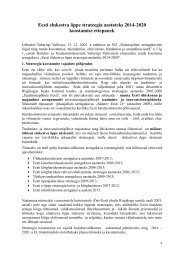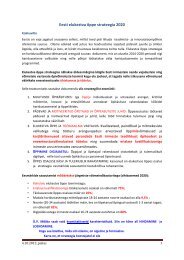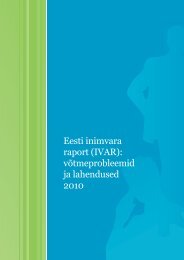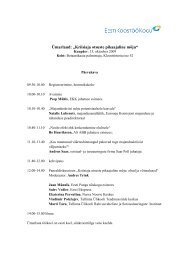Estonian Human Development Report
Estonian Human Development Report - Eesti Koostöö Kogu
Estonian Human Development Report - Eesti Koostöö Kogu
You also want an ePaper? Increase the reach of your titles
YUMPU automatically turns print PDFs into web optimized ePapers that Google loves.
Table 4.2.1. Factors forming general satisfaction among ethnic minority groups in European countries by country<br />
Ranking of countries based on satisfaction * Association of satisfaction to the aggregate index **<br />
General satisfaction/feeling<br />
of<br />
happiness<br />
Satisfaction<br />
with material<br />
situation<br />
Satisfaction with<br />
the performance of<br />
the state<br />
General satisfaction/feeling<br />
of<br />
happiness<br />
Satisfaction<br />
with material<br />
situation<br />
Satisfaction with<br />
the performance<br />
of the state<br />
Finland 1 6 2 0.126 0.711 0.831<br />
Switzerland 2 1 3 0.767 0.751 0.795<br />
Norway 5 3 4 0.643 0.627 0.646<br />
Cyprus 3 14 1 0.659 0.523 0.679<br />
Denmark 6 4 5 0.563 0.783 0.827<br />
Sweden 9 2 8 0.716 0.811 0.753<br />
Spain 4 7 7 0.473 0.691 0.649<br />
Ireland 8 8 6 0.641 0.713 0.875<br />
United Kingdom 7 5 12 0.654 0.607 0.785<br />
Austria 10 9 9 0.750 0.649 0.854<br />
The Netherlands 13 10 10 0.670 0.660 0.807<br />
Belgium 12 16 11 0.830 0.712 0.685<br />
Germany 14 13 13 0.758 0.708 0.792<br />
Slovenia 11 11 16 0.816 0.741 0.720<br />
France 15 12 14 0.644 0.662 0.748<br />
Portugal 16 17 17 0.515 0.764 0.801<br />
ESTONIA 17 15 19 0.779 0.709 0.734<br />
Slovakia 19 20 15 0.797 0.763 0.830<br />
Poland 21 19 21 0.748 0.714 0.856<br />
Latvia 18 18 22 0.779 0.652 0.750<br />
Romania 20 24 18 0.830 0.647 0.839<br />
Russia 22 22 20 0.753 0.741 0.795<br />
Hungary 23 21 23 0.782 0.778 0.799<br />
Ukraine 24 23 24 0.807 0.768 0.678<br />
Bulgaria 25 25 25 0.753 0.574 0.713<br />
Average*** 7.5 5.34 5.44 0.690 0.698 0.770<br />
Leg 4.00 3.88 4.67 0.704 0.288 0.229<br />
* The scores of the individual countries are ranked, and each country has been assigned a ranking for each specific satisfaction variable (1 to 25).<br />
** Correlations have been calculated between the aggregate satisfaction index (includes all 7 individual variables) and satisfaction in individual<br />
fields of activity (3 satisfaction sub-indexes). A Pearson correlation coefficient value that is close to 1 means a strong association between the two<br />
variables, while a value close to 0 shows a weak association and lack thereof. All the coefficients shown in the table are statistically significant (at a<br />
significance level of p≤.01). The strongest coefficient, or the most important factor in the formation of general satisfaction in the specific country is<br />
marked in bold.<br />
*** The first half of the table shows calculations of the average satisfaction values (maximum satisfaction value 11 and minimum 0). The second half<br />
of the table shows calculations of the average correlations for the countries in case of specific pairs of variables.<br />
Source: European Social Survey 2006<br />
nia there are no large ethnic political parties, while there<br />
are in Latvia, which has just as large a minority population),<br />
etc. The younger generation is characterized by a<br />
more ignorant attitude toward politics and great scepticism<br />
regarding institutions in both Europe and Estonia<br />
(see Annex 4.2.2).<br />
Association of satisfaction with<br />
general social integration<br />
Previous chapters have shown that surrounding social<br />
relations form one of the important components of the<br />
quality of life and life satisfaction. (Kasearu & Trumm<br />
2008). Research dealing specifically with ethnic minorities<br />
also shows that the satisfaction evaluations of immigrants<br />
are significantly impacted by social capitalization,<br />
such as familial contacts (Bajekal et al. 2004), as well as the<br />
perceived position of the majority or minority in the society<br />
(Verkuyten 1986). In the case of Estonia, it has turned<br />
out that these factors are important, for instance, in the<br />
creation of cultural openness (Masso 2009). The following<br />
analysis focuses on the relationships between satisfaction<br />
and social integration.<br />
| 84















